| Srl | Item |
| 1 |
ID:
098232
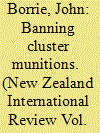

|
|
|
| 2 |
ID:
100307
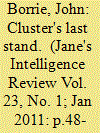

|
|
|
| 3 |
ID:
069010
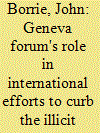

|
|
|
| 4 |
ID:
131442
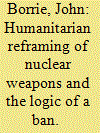

|
|
|
|
|
| Publication |
2014.
|
| Summary/Abstract |
The achievement of past international treaties prohibiting anti-personnel mines and cluster munitions showed that unpropitious political situations for dealing with the effects of problematic weapons could be transformed into concrete, legally binding actions through humanitarian-inspired initiatives. Although there is now renewed concern about the humanitarian consequences of nuclear weapons, some policy makers dispute the relevance of these past processes. This article examines how and why cluster munitions became widely reframed as unacceptable weapons, and the nature and significance of functional similarities with contemporary efforts of civil society activists to instigate humanitarian reframing of nuclear weapons and promote the logic of a ban treaty in view of its norm-setting value among states. In the case of cluster munitions, the weapon in question was signified as unacceptable in moral and humanitarian law terms because of its pattern of harm to civilians with reference to demonstrable evidence of the consequences of use. Ideational reframing was instigated by civil society actors, and introduced doubts into the minds of some policy-makers about weapons they had previously considered as unproblematic. This is relevant to the current discourse on managing and eliminating nuclear weapons in the Nuclear Non-Proliferation Treaty, in which there is dissonance between the rhetoric of those states claiming to be responsible humanitarian powers and their continued dependence on nuclear weapons despite questions about the utility or acceptability of these arms.
|
|
|
|
|
|
|
|
|
|
|
|
|
|
|
|
| 5 |
ID:
089857


|
|
|
|
|
| Publication |
2009.
|
| Summary/Abstract |
The Convention on Cluster Munitions (CCM) is a stunning achievement. It sets a new international legal form and enshrines a comprehensive package of weapon-specific measures to ban cluster munitions that endanger civilians, clear contaminated land and help vitims. By adopting a humanitarian disarmament approach, the Oslo process also sends a powerful signal that progress is still possible on arms control-related priorities of international concern despite considerable difficulties in recent years.
|
|
|
|
|
|
|
|
|
|
|
|
|
|
|
|
| 6 |
ID:
074541


|
|
|
| 7 |
ID:
161330
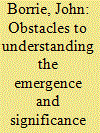

|
|
|
|
|
| Summary/Abstract |
This article examines the emergence of the UN Treaty on the Prohibition of Nuclear Weapons from a critical perspective, including how and to what degree efforts to alter states’ framing of nuclear weapons was a factor in the treaty's emergence and negotiation. It examines the so-called humanitarian initiative on the consequences of nuclear weapons, the activities of the International Campaign to Abolish Nuclear Weapons and the roles played by transnational institutions like the United Nations and the Red Cross Movement. In view of this case, lessons and limits on transnational advocacy network models of norm emergence are highlighted. In order to contribute to the process of better understanding the emergence and significance of the prohibition treaty process based on research, some areas are identified in which evidence gathering and theorizing are needed.
|
|
|
|
|
|
|
|
|
|
|
|
|
|
|
|
| 8 |
ID:
154207


|
|
|
| 9 |
ID:
093291


|
|
|
|
|
| Publication |
New York, United Nations, 2009.
|
| Description |
xxvii, 488p.
|
| Standard Number |
9789290451969
|
|
|
|
|
|
|
|
|
|
|
|
Copies: C:1/I:0,R:0,Q:0
Circulation
| Accession# | Call# | Current Location | Status | Policy | Location |
| 054637 | 341.37/UNI 054637 | Main | On Shelf | General | |
|
|
|
|